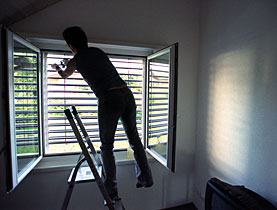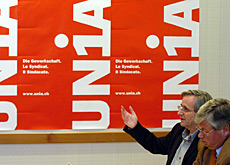Single parents unite in plea for backup

A Swiss family organisation says authorities must do more to counter the poverty and job-related problems facing the country's growing ranks of single parents.
“Switzerland is not devoting enough resources to promote a family policy,” said Lucrezia Meier-Schatz, the managing director of the organisation Pro Familia.
The group says authorities are unprepared to respond to future demographic, economic and cultural challenges.
Meier-Schatz’s comments came ahead of the International Day of the Family conference in Bern, where groups from around Europe gathered to discuss how to change the fortunes of some of the continent’s neediest citizens.
The conference was also the launch of a campaign by the European Network of Single Parent Families calling on governments to fight increasing poverty in one-parent households.
The network says that child poverty in Europe has reached a “dramatic level” and that it is worse in single parent families, which are at a 35 per cent risk of falling into poverty. The risk for families with two parents is 19 per cent.
The number of single parent households has grown by 11 per cent in the past decade, accounting for around 15 per cent of all Swiss families. The majority of single parents – 85 per cent – are women.
Lower salaries for women
Single parent households are poorer because mothers – who most often raise the children – usually have lower salaries than men. Legal wrangling also means that alimony is not always paid when couples split.
Although the European Union has made fighting poverty one of its main goals, it has no formal policies for reducing the risk in single parent families.
The network’s campaign, No Child Poverty in Europe, calls for guarantees that part of the budget for the 2010 European Year Against Poverty will be spent on single parents.
Support groups point to a successful welfare state “parent-worker” model that benefits single parents, currently most effectively applied in Scandinavia, where the balance between work and family life is more equal. Childcare is good and there is generous parental leave.
“I think we need to look at the parent-worker model as a way forward for the future because it has shown to be much more successful in countries like Sweden, and takes into account that workers are also parents or may be in the future and it supports them in that process,” Sue Cohen, a conference speaker and the director of the British Single Parent Action Network, told swissinfo.ch.
But she added that the assumptions about family and gender relations underlying state policies also needed to be closely examined.
“Our vision should be wider in terms of gender equality. In those countries where there is greater equality between men and women, everybody does better.”
Ending inequality
To counter the negative trends in western Europe, Pro Familia says Switzerland needs to offer childcare facilities that correspond more to regular working hours. Professional training should be promoted for young women, and women who return to work after childcare leave should be offered more flexible working hours.
“You need to account for inequalities out there,” says Roger Nordmann, a parliamentarian from Lausanne.
“Some families have more possibilities [of support to help with their children] because of their cultural backgrounds, their formation and education.
“I think we have to organise help at a state level for children of families who do not have such possibilities, in order to compensate and give everyone an equal chance.”
Specifically, he says, childcare provision needs to be stepped up, better financial support offered and the wider community needs to play its part in helping parents.
“Politics is a mirror of society. Politics can inject some changes but society has to follow, otherwise it doesn’t work. You cannot resolve every problem by law or by subsidies.”
“There needs to be solidarity in society with parents,” Nordmann said. “You cannot bring up children on your own. Neighbours and grandparents need to be able to help.”
Jessica Dacey, swissinfo.ch
The European Network of Single Parent Families launched the campaign No Child Poverty in Europe at its annual meeting in Bern.
It calls on all European countries to be proactive in the 2010 European Year Against Poverty and Social Exclusion and to undertake specific activities to end child poverty in single parent families.
The 2010 European Year Against Poverty and Social Exclusion has a budget of around €26 million (SFr39 million).
The campaign is calling for a guaranteed part of the budget to be spent on specific programmes to fight the poverty of children in single parent families.
Single parent families in Switzerland:
1970: 106,000
1990: 145,000
2000: 161,000
2007: 180,000
Single parents account for 5.4% of households and 17% of families with children.
Mothers raising children on their own on average spend 48 hours a week on housework and 22 hours in a profession. Men single parents spend 32 hours on housework and 39 at a job.
In two parent families, women spend 53 hours on housework and 14 in a job, while men devote 14 hours to housework, and 41 at a job.
10% of single parents are “working poor”. Their low pay means they remain in relative poverty despite working a regular working week.
In 2006, 18% of single parents received social benefits.

In compliance with the JTI standards
More: SWI swissinfo.ch certified by the Journalism Trust Initiative












You can find an overview of ongoing debates with our journalists here . Please join us!
If you want to start a conversation about a topic raised in this article or want to report factual errors, email us at english@swissinfo.ch.